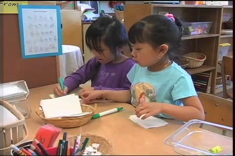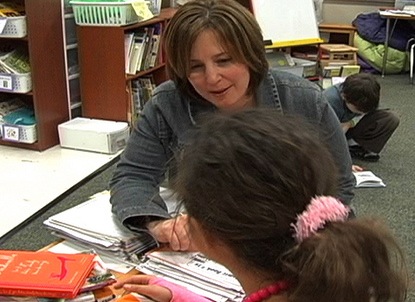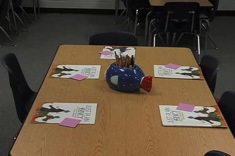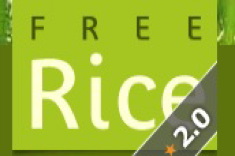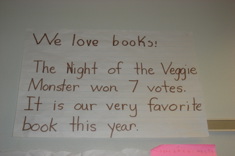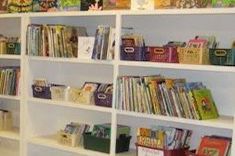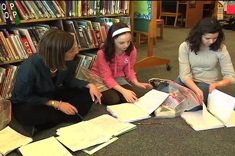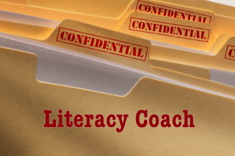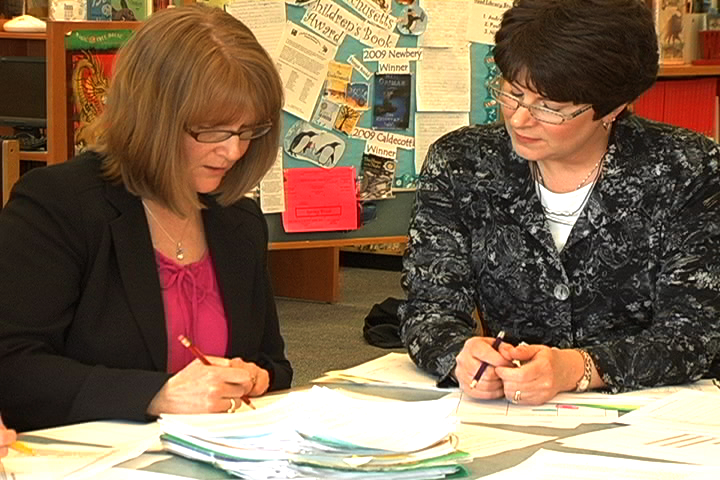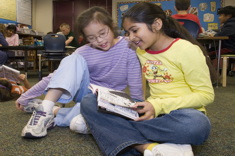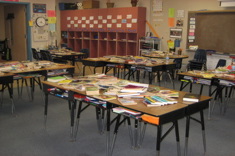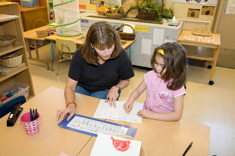Library
Choice Literacy Articles & Videos
The Choice Literacy library contains over 3,000 articles and 900 videos from 150+ contributors. Classic Classroom and Literacy Leadership subscribers have access to the entire library. Content is updated continuously, with five to six new features published each week.
Latest Content
Preschool Letter Detectives
Andie Cunningham works with three-, and four-year-olds as they become "letter detectives." This activity is a wonderful bridge between children's natural curiosity and the alphabet, suitable for preschoolers or kindergartners.
Making Time for Literacy Chitchat to Support Book Choice
Franki Sibberson shares ways to initiate conversations about books naturally in classrooms. The feature includes a question set for launching discussions about books with individual students.
Ready for Guided Reading?
Shari Frost writes about the “Level A Purgatory” many kindergartners and young students endure when teachers assign reading groups too early. Her feature includes other instructional options beyond small groups for early in the year that may be more appropriate for our youngest learners.
Animals as Ambassadors: Using Class Pets to Reach an English Language Learner
When a student is struggling, language barriers can make it even harder for teachers to connect. Andrea Smith finds webbing during conferring is an excellent strategy for assisting a young English language learner in her writer's workshop.
Making Time for Play
Can we make time for play with our youngest learners, and still insure they are getting the literacy skills they need? Absolutely! says Shari Frost, as she shares many strategies the coaches and teachers she works with use to make letter, sound, and word learning fun.
Free Rice: Tools for Web-Based Vocabulary Learning
Mary Lee Hahn shares how she uses Free Rice in her classroom, as well as other online vocabulary learning tools.
Books We Love: Building a Reading Community
Katie DiCesare talks about how her first graders closed out the year with a sequence of activities analyzing their favorite books individually and as a community.
Sharing Our Lives as Readers with Our Students
Students look to us as model readers. Franki Sibberson explains how a quick explanation of your habits and preferences can be a wonderful start to year-long conversations.
A Workshop Model in the Library: Time for More Than Book Checkout
Franki Sibberson shares ideas for library browsing baskets, as well as ways to integrate minilessons into the school library routine.
Making Book Logs Purposeful for Students
Is the use of reading logs getting a little stale in your classroom? Clare Landrigan and Tammy Mulligan have suggestions for assessing and refreshing the activity.
Swimming and Learning
Mary Lee Hahn uses her experience as a swimmer to take another look at standards.
If You Like Captain Underpants: Related Books for Students (BOOKLIST)
Franki Sibberson has suggestions for sustaining the interest of kids who love silly and gross fun in this booklist.
Looking for Evidence: Seven Questions
With all the things teachers could focus on in their observations of students, what are the key behaviors to look for in assessing literacy growth and development? Ruth Shagoury notes the questions she uses to focus her observations and assessment of student comprehension of texts.
New Versions of Old Favorites (BOOKLIST)
Recently there has been less interest in retelling of classic tales by children’s book authors. Franki Sibberson’s booklist highlights some of the best new twists on favorite children’s stories.
The Luxury of Extra Reading Time Over the Holidays
Franki Sibberson finds the days before holiday break are the perfect time for talking through with students how to make pleasure reading choices. Her feature includes a template to help students organize and think through their preferences.
If Boot Camp Was Standards-Based
Franki Sibberson's article this winter linking her learning from fitness boot camp to working with struggling readers was one of our most popular features ever. Here she provides a follow-up to share new lessons from bootcamp in a standards-based world.
Troubleshooting Coaching Cycles
Shari Frost finds "coaching cycles" are a valuable way for literacy coaches to work with teachers over time, but the first year of implementation was bumpy for her coaches. She shares some of the struggles her colleagues encountered in implementing cycles, as well as advice for overcoming these hurdles.
Supporting Readers During Workshops: The First Few Weeks
Katie DiCesare ponders the different ways students need to be supported in her primary classroom during the early days of the school year.
Structuring Coaching Conferences
Get the most of your one-on-one coaching conferences with these suggestions from Clare Landrigan and Tammy Mulligan.
The Bed and Breakfast Model: An Analogy for Schools
Have you ever struggled as a literacy leader to explain the balance between creativity and common standards in teaching; between shared expectations and individuality? Clare Landrigan and Tammy Mulligan present an analogy that might help.
Inspiration from Author Visits: Tips and Web Resources
Jennifer Jones reflects on the power of a local author visit in her school, and also provides some quick tips and weblinks for planning a visit.
Fairy Tales for Middle Grade Readers (BOOKLIST)
This booklist is on fairytales, and there are a range of reading levels and styles to support readers of different ability levels.
Models, Coaches, Shepherds, or Rock Stars? Our Reading Roles in the First Few Weeks of School
Cheerleader? Shepherd? Rock Star? Coach? Andrea Smith considers her changing reading “roles” early in the school year as she tries to build a classroom community that shares her passion for literacy.
A Tornado of Books
By upending the classroom library and asking students to sort and reorganize it, Karen Terlecky gets insight every year into the ways students categorize texts, as well as their emerging understanding of genre.
Why and Watch Me: Making the Abstract Concrete for Readers
Clare Landrigan and Tammy Mulligan present some teacher question and reflection prompts for helping struggling readers understand why and how reading is a meaning-making process.
Books to Get Us Ready for Summer Vacation
Franki Sibberson finds preparing students for summer reading is a little different this year, now that she has moved from classroom teaching to work in the school library. Here are some terrific books to get students excited about summer.
Aligning Curriculum with Struggling Readers in Mind
This is a terrific article for a team considering struggling learners to read together and discuss. Franki Sibberson asks some critical questions, including how many transitions and different adults some children work with each day in the name of getting all the support they need.
On Not Fretting
Kelly Petrin’s meditation phrase for the day—Do not fret; it only leads to evil—guides her through a home visit with a parent who worries about her daughter’s literacy skills. This is a terrific short read for thinking through how to make encounters with parents less stressful.
Talking with Parents about Text Difficulty
Clare Landrigan and Tammy Mulligan write about how to share the research base and goal of producing lifelong readers with families in understandable terms. The article includes a handout to share at parent meetings.
Self-Fulfilling Prophecies: Recommending Yourself
Suzy Kaback asks her students to write letters of recommendations for themselves, and finds that the activity ripples across the school mentoring community. This exercise is a terrific catalyst for creating personal improvement plans.
Browse Content By
Type
Category
- Assessment Tools
- Big Fresh Archives
- Booklists
- Choice Numeracy
- Classroom Design
- Common Core
- Community Building
- Conferring
- Content Literacy
- Digital Literacy
- English Language Learners
- Equity
- Family Relations
- Free Samples
- Guiding Groups
- Leadership
- Literacy Coaches
- Mentor Texts
- Minilessons
- New Teacher Mentors
- Podcasts
- Poetry
- Quote Collections
- Reading Strategies
- Self Care
- Struggling and Striving Learners
- Talking and Listening
- Teacher Study Groups
- Teaching Reading
- Teaching Writing
- Word Study and Vocabulary
Author
- Melissa Quimby
- Nawal Qarooni
- Gwen Blumberg
- Julie Cox
- The Lead Learners
- Hannah Tills
- Josie Stewart
- Ruth Metcalfe
- Mallory Messenger
- Becca Burk
- Jodie Bailey
- Vivian Chen
- Mary Brower
- Tiffany Abbott Fuller
- Stephanie Affinito
- Ruth Ayres
- Leigh Anne Eck
- Heather Fisher
- Shari Frost
- Julie Johnson
- Suzy Kaback
- Gigi McAllister
- Shirl McPhillips
- Melanie Meehan
- Cathy Mere
- Debbie Miller
- Tara Barnett and Kate Mills
- Tammy Mulligan
- Dana Murphy
- Bitsy Parks
- David Pittman
- Brenda Power
- Heather Rader
- Matt Renwick
- Mandy Robek
- Christy Rush-Levine
- Gretchen Schroeder
- Jen Schwanke
- Brian Sepe
- Katherine Sokolowski
- Stella Villalba
- Jennifer Vincent
Grade Level
Choice Literacy Membership
Articles
Get full access to all Choice Literacy article content
Videos
Get full access to all Choice Literacy video content
Courses
Access Choice Literacy course curriculum and training

